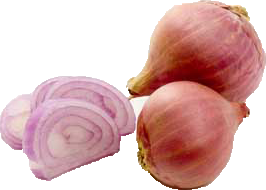|
Shallots or
eschalots are long, slender, underground, fleshy stems in the Allium family of
tunicate bulb vegetables. In general, they differ from the onions in being
smaller, and grow in clusters of bulbs from each plant-root system. The bulbs
are characteristically less pungent than that of onions and garlic, which makes
them one of the favourite ingredients in cuisine across the regions.
This bulb
vegetable is probably originated in the Central Asian region, and today,
cultivated as a major commercial crop in all the continents. Botanically, it
too like its fellow bulb and stem (leeks) vegetables belong to the Alliaceae
family, in the genus, Allium. Scientific name: Allium cepa var. aggregatum.
Shallots are cool
season perennials; however, they can be grown as annual crops just like onions.
The quickest way to grow them is from ready-made sets, usually available from
nearby nurseries. The plant reaches about 50 cm in height, and bears 1-5 cloves
of bulblets just underneath the surface. It takes about 100 days when the bulbs
are ready for harvesting. Mature bulbs are then cured under dry air, and stored
in the same manner as onions. Like in other allium species, shallot's top
greens and flower heads are also eaten in many parts of the world.
|
|
Overall, shallots
have better nutrition profile than onions. On weight per weight basis, they
have more anti-oxidants, minerals, and vitamins than onions.
They are rich
source of flavonoid anti-oxidants such as quercetin, kemferfol…etc. Further,
they contain sulphur anti-oxidant compounds such as diallyl disulfide, diallyl
trisulfide and allyl propyl disulfide. These compounds convert to allicin
through enzymatic action following disruption of their cell surface while
crushing, and chopping.
Research studies
show that allicin reduces cholesterol production by inhibiting the HMG-CoA
reductase enzyme in the liver cells. Further, it also found to have
anti-bacterial, anti-viral, and anti-fungal activities.
Allicin also
decreases blood vessel stiffness by releasing vasodilator chemical nitric oxide
(NO) and thereby help bring a reduction in the total blood pressure. Further
research studies suggest that allicin inhibit the platelet clot-formation in
the blood vessels that helps decrease an overall risk of coronary artery
disease (CAD), peripheral vascular diseases (PVD), and stroke.
The
phyto-chemical compounds allium and Allyl disulfide in onion have
anti-mutagenic (protects from cancers) and anti-diabetic properties (helps
lower blood sugar levels in diabetics).
Shallots hold
several fold more concentration of vitamins and minerals than in onions,
especially vitamin A, pyridoxine, folates, thiamin, vitamin C etc. Pyridoxine
(B-6) raises GABA chemical level inside the human brain that help soothe
nervous irritability. In addition, 100 g fresh shallots carry 1190 IU (35% RDA)
of vitamin A. Vitamin A is a powerful antioxidant that helps protect from lung
and oral cavity cancers.
Further, they are
also good in minerals and electrolytes than onions; particularly iron, calcium,
copper, potassium, and phosphorus.
Antioxidant
Activity: Perhaps the best nutritional bonus of
shallots is the high and diverse content of antioxidant compounds, including
quercetin, kemferol, and various sulfuric antioxidants. These antioxidants are
released when the cell surface is disrupted, which happened during slicing or
crushing, similar to garlic. When these antioxidants are released, they form
another valuable compound called allicin. This powerful compound helps to
reduce cell mutation and various cancers. Studies have connected shallots to a
reduction in lung and oral cancers, as well as stomach, colorectal, and breast
cancer.
Circulation and
Metabolism: The mineral content of shallots is typically
higher than that of onions, including iron, copper, and potassium. Iron and
copper can help to boost circulation in the body by stimulating the production
of red blood cells. With more RBC in the blood stream, blood circulation
increases, bringing more oxygen to important areas of the body and increasing
energy, vitality, cell regrowth, healing, and metabolism.
Cholesterol and
Heart Health: Allicin, the compound formed when shallots
are sliced and diced, has been directly linked to regulating cholesterol levels
in the body. Allicin actually inhibits an reductase enzyme that is produced in
the liver, which is the enzyme that controls cholesterol production. By
lowering total cholesterol levels in the body, shallots can help prevent
atherosclerosis, coronary heart disease, heart attacks, and strokes.
Blood Pressure: The combination of potassium, a well-known vasodilator, and the
action of allicin, which releases nitric oxide in the body, blood pressure is
significantly decreased. A vasodilator relaxes the walls of the blood vessels
and allows blood to flow more freely. This prevents clotting and stress on the cardiovascular
system, further boosting heart health.
Diabetes Control: Two of the phytochemical compounds found in shallots, allium and
allyl disulfide, have anti-diabetic properties, meaning that they help to
regulate the levels of blood sugar in the body. This can be very helpful for
diabetics who need to keep their blood sugar levels under control.
Soothes Nerves: The various minerals and vitamins found in shallots, including
pyridoxine, can help to stimulate the release of GABA in the brain, which is
very important for maintaining low stress levels and keeping the hormones in
the body at the proper levels. If you want to reduce stress or relax your mind,
shallots can give you a quick GABA boost. Folic acid is also found in
significant quantities in shallots, which is an essential B-vitamin that can
help with mental and emotional help by regulating hormonal and enzymatic
reactions in the brain.
A Final Word of Caution: There are no common allergies to shallots, like most members of
that species (onions and garlic). However, rare allergies do exist, so monitor
your body and consume shallots in moderation.
|

